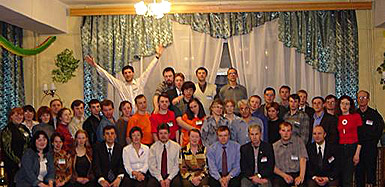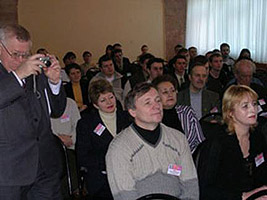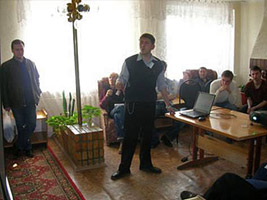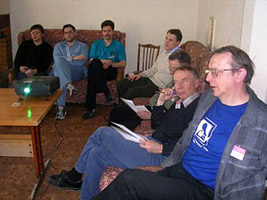Postgraduate School
When it was created in 1977, the Institute of Applied Physics was given the task of training highly qualified scientists working effectively on the subjects of research at the Institute. A faculty of trainee researchers (and then trainee engineers as well) was organized on the initiative of the Directors Board in the first months of the institute work. Professor Mikhail A. Miller became the head of this faculty. The main task of the faculty was to ensure that young researchers are aimed, as soon as possible, at the fulfillment of scientific problems. To this end, they were attached to their supervisors and reported annually on the results of their research before the qualified commission. An atmosphere for most favored scientific and creative growth of young people was created in almost all the teams. About 200 young researchers have passed through the trainee faculty, and many of them are working successfully at the Institute today. Post-graduate courses in five specialties (radiophysics, including quantum radiophysics, physical electronics, including quantum electronics, plasma physics, plasma chemistry, acoustics, and geophysics) opened in 1977. Two more specialties (solid-state electronics and microelectronics, and computer engineering for research applications) were added in the post-graduate courses in 1985. At present, the IAP RAS has a perpetual license (registration number 2527 of March 5, 2012) to conduct educational activities in the system of post-graduate education in seven specialties, which cover almost the entire spectrum of the studies carried out at the Institute and include
01.04.03 – radiophysics
01.04.04 – physical electronics
01.04.06 - acoustics
01.04.08 – plasma physics
01.04.21 – laser physics
05.13.18 – mathematical simulation, numerical methods and software systems
25.00.29 – physics of the atmosphere and hydrosphere
For 35 years of the existence of the Institute, about 350 students graduated from the post-graduate courses, including five corresponding members of the RAS (A. M. Sergeev, V. V. Kocharovsky, E. A. Mareev, E. A. Khazanov, and G. G. Denisov), and leaders at all levels from deputy directors to heads of departments and laboratories, professors and doctors of science. Many graduates of the courses won awards and prizes of the Government of the Russian Federation and Russian Academy of Sciences. The dynamics of admission to and graduation from post-graduate courses since 2000 to date, distribution of post-graduates in specialties, and the dynamics of thesis defense in the dissertation councils of the IAP RAS are given in Statistics.
Students are admitted to the post-graduate courses in accordance with post-graduate admission rules of the Institute of Applied Physics RAS, coordinated with the Provisions for training of scientific-pedagogical and scientific personnel in the post-graduate education system (Order of the Ministry of general and professional education of the Russian Federation of March 27, 1998) and supplements. The average number of graduate students is 40 and the annual enrollment in post-graduate courses is 12-15. The post-graduate courses are replenished mainly with graduates of HSGAP and the Radiophysical Faculty of NNSU. To date (December 1, 2012) 40 graduate students attend the full-time post-graduate courses.
Training of the graduates obeys the main professional education program of post-graduate professional education, in accordance with the training schedules and plans approved by scientific councils of the IAP RAS divisions.
During education, the graduate students take candidate of science examinations. In the first year, they take candidate of science examinations in the English language, history,  and science philosophy. The second year is dedicated to training before the candidate of science examination in specialty. Scientific work with graduates is done under the guidance of their supervisors, following individual plans approved by the scientific councils of the divisions. Annually, each graduate is certified, speaking for the scientific councils of the divisions and reporting on tutorial and scientific work done for the academic year. One form of increasing the creative activity of young people is a contest for young scientists in the age before 33, which is dedicated to the Day of Russian Science and in which the graduates actively participate. According to the results of this contest, which is organized in the form of a discussion of scientific reports of the participants by the competent award panel, the winners are awarded cash prizes. The results of the contest are regularly discussed by the Scientific council of the IAP RAS, where the winners are given diplomas. Scientific sessions of young scientists are conducted annually by the Ministry of education of the Nizhny Novgorod region with the active participation of the IAP RAS (there have been a total of 16 sessions), and each year the IAP RAD graduates become the winners and are awarded diplomas of highest degrees. Sessions of young scientists are simultaneously a qualifying contest for Academician G. A. Razuvaev scholarships established by the Administration of the Nizhny Novgorod region, and the graduate students of the Institute are invariably among the winners.
and science philosophy. The second year is dedicated to training before the candidate of science examination in specialty. Scientific work with graduates is done under the guidance of their supervisors, following individual plans approved by the scientific councils of the divisions. Annually, each graduate is certified, speaking for the scientific councils of the divisions and reporting on tutorial and scientific work done for the academic year. One form of increasing the creative activity of young people is a contest for young scientists in the age before 33, which is dedicated to the Day of Russian Science and in which the graduates actively participate. According to the results of this contest, which is organized in the form of a discussion of scientific reports of the participants by the competent award panel, the winners are awarded cash prizes. The results of the contest are regularly discussed by the Scientific council of the IAP RAS, where the winners are given diplomas. Scientific sessions of young scientists are conducted annually by the Ministry of education of the Nizhny Novgorod region with the active participation of the IAP RAS (there have been a total of 16 sessions), and each year the IAP RAD graduates become the winners and are awarded diplomas of highest degrees. Sessions of young scientists are simultaneously a qualifying contest for Academician G. A. Razuvaev scholarships established by the Administration of the Nizhny Novgorod region, and the graduate students of the Institute are invariably among the winners.

|

|

|
V. F. Vdovin at the opening
of the Session of young scientists |
Theoretical group is at work. Prof. S. V. Golubev,
Deputy director for science of IAP RAS, among the award panel |
The graduate students of the IAP RAS actively participate in the implementation of research programs and contracts, work of scientific conferences and schools carried out both in the Russian Federation and abroad. Annually, the results of their work (publications, participation in programs and contracts, reports at scientific conferences, organization, etc.) are submitted to the Post-graduate department and are included in the Annual report of the Institute.
The relations between the graduates of the Institute and foreign scientific institutions are extending. The practice of joint training of IAP RAS graduates and foreign research centers, as well as work under contracts with foreign colleagues, is retained. Almost all the graduates are involved in pedagogical work at the Scientific and Educational Center of the IAP RAS with schoolchildren and students and actively participate in the organization and conducting of summer physical and mathematical schools in Green Town.
Part of the employees of the Institute are preparing their candidate of science thesis as Ph.D applicants.





